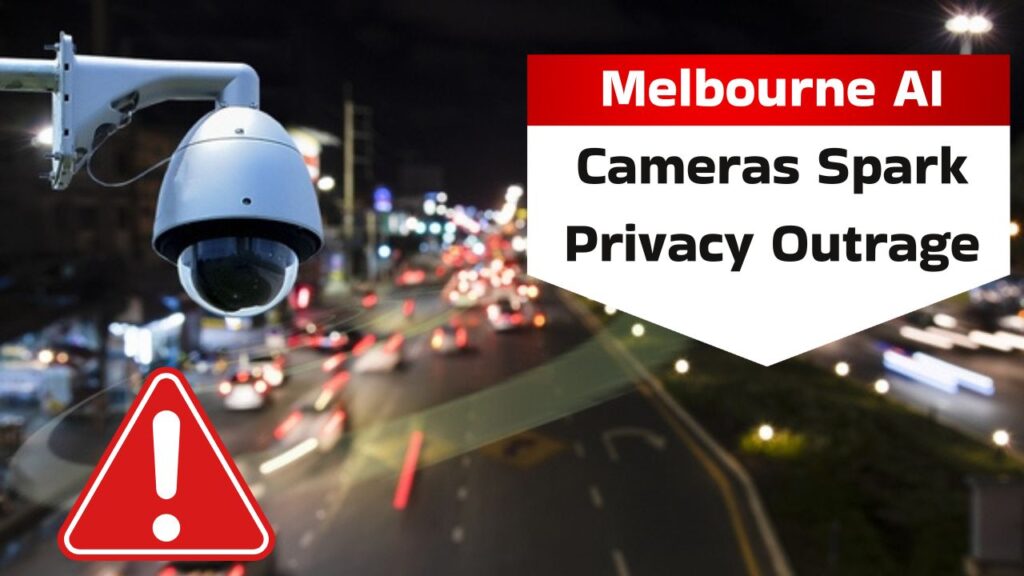AI Traffic Cameras in Melbourne Raise Privacy Concerns – Artificial Intelligence (AI) traffic cameras in Melbourne have recently come under intense scrutiny after reports revealed major data privacy risks affecting thousands of Australian motorists. These smart cameras, designed to detect speeding, phone use, and seatbelt violations, are now raising concerns about how personal data is collected, stored, and shared. As AI surveillance expands across Victoria, experts warn that without strict regulation, citizens’ private information could be exposed or misused. Let’s explore how these advanced systems work, their potential risks, and what the Australian government plans to do about it.

AI Traffic Cameras in Australia and Privacy Issues
AI traffic cameras across Australia have been praised for improving road safety but criticized for invading citizens’ privacy. These cameras can automatically recognize faces, license plates, and even predict driver behavior, leading to potential misuse of sensitive information. In Melbourne, privacy advocates argue that data collected through AI systems may be retained longer than necessary, increasing risks of breaches. Australian motorists are particularly concerned that their movements and habits are being recorded without full consent, pushing the government to consider stronger legal safeguards to protect personal data from unauthorized access.
Melbourne’s Smart Camera Network and Data Concerns
Melbourne’s smart traffic camera network, equipped with high-resolution sensors and AI-driven image analysis, continuously monitors road activity to enforce traffic laws. However, a recent report revealed that the same network might store metadata like location, time, and vehicle type, which could be accessed by third parties. Australian privacy laws currently lag behind the pace of AI technology, leaving gaps in protection for citizens. As the Melbourne government expands its AI surveillance network, calls for transparency and accountability are growing stronger among residents and digital rights groups.
| Aspect | Details |
|---|---|
| Technology Used | AI-powered image recognition and sensors |
| Primary Purpose | Detect speeding, phone use, and seatbelt violations |
| Data Collected | License plates, images, time, and location data |
| Privacy Concern | Data storage and third-party access risks |
| Government Response | Review of AI privacy and data retention laws |
Australian Citizens Demand Stronger AI Privacy Regulations
Across Australia, citizens are demanding stronger privacy regulations to prevent potential misuse of AI surveillance data. Civil rights organizations have urged lawmakers to establish clearer limits on how long traffic data can be stored and who can access it. Public pressure has increased after reports of AI errors misidentifying drivers or issuing false fines. Australian citizens are calling for transparent oversight committees and independent audits of the Melbourne traffic camera system to ensure fairness and prevent data exploitation by private contractors or external agencies.
Government Action on AI Traffic Surveillance in Victoria
The Victorian government is now reviewing its data protection framework to address these emerging privacy issues. Officials have pledged to implement stricter auditing processes and introduce fines for companies mishandling AI-generated data. Experts also recommend anonymizing all driver information before storage to limit potential misuse. As Melbourne continues modernizing its transport systems, the balance between road safety and data privacy will remain a key policy debate shaping the future of AI governance in Australia.
Frequently Asked Questions (FAQs)
1. Why are AI traffic cameras controversial in Melbourne?
They are controversial because of growing concerns about personal data collection and privacy breaches.
2. What kind of data do Melbourne AI cameras collect?
These cameras capture license plates, driver images, time stamps, and location information.
3. Is the Australian government taking action on this issue?
Yes, the Victorian government is reviewing privacy laws and AI data protection measures.
4. Can citizens opt out of AI traffic camera monitoring?
No, participation is mandatory as the cameras operate on public roads for law enforcement.




